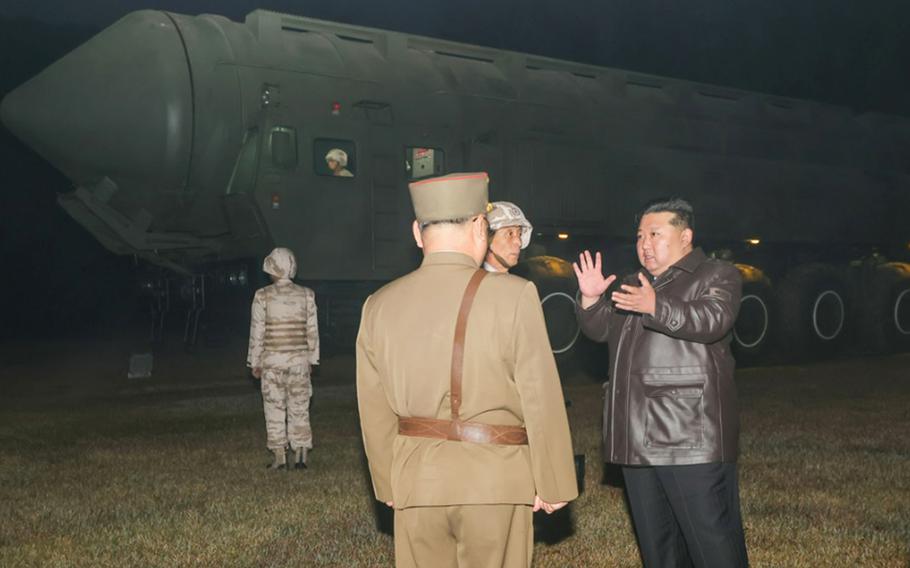
North Korean leader Kim Jong Un attends the launch of a Hwasongpho-19 intercontinental ballistic missile on Oct. 31, 2024, in this image from the state-run Rodong Sinmun newspaper. (Rodong Sinmun)
SUWON, South Korea — North Korea fired several short-range ballistic missiles off its eastern coast Tuesday, the South’s military said, just hours before Americans head to the polls.
At least seven missiles were launched between 7:30 a.m. and 7:39 a.m. from about 35 miles south of Pyongyang, according to the South Korean Joint Chiefs of Staff and Japan’s Ministry of Defense. They flew approximately 250 miles before splashing down
Japan assessed the missiles reached a peak altitude of 62 miles before falling outside the country’s exclusive economic zone, according to its news release posted on its website.
The weapons did “not pose an immediate threat” to the U.S. or its allies, U.S. Indo-Pacific Command said in its own news release.
North Korea has fired more than 45 ballistic missiles in 12 separate days of testing so far this year.
Tuesday’s launch came five days after the North launched an intercontinental ballistic missile that flew 620 miles to a peak altitude of 4,776 miles, a record for the communist regime, according to the state-run Korean Central News Agency.
Air forces from the U.S., South Korea and Japan conducted a bomber escort drill over the air identification zones between Seoul and Tokyo on Sunday in direct response to the ICBM test, according to the South’s military that day.
One B-1B Lancer out of Ellsworth Air Force Base, S.D., was escorted by two U.S. F-16 Fighting Falcons, four South Korean F-15K Slam Eagles and four Japanese F-2s, according to aircraft tail markings in photos from the South’s Ministry of National Defense.
Kim Yo Jong, North Korean leader Kim Jong Un’s sister, described the allies’ show of force as a “frantically staged” demonstration in a statement through KCNA on Tuesday.
The U.S., South Korea and Japan’s military drills pose a “serious threat to not only our state, but also regional peace and security,” she said in the report.
Tuesday’s launch occurred a day before the presidential election takes place in the United States.
The next U.S. president will be facing new challenges from Pyongyang, North Korean Ambassador to the U.N. Song Kim said in a Sept. 30 speech at the organization’s headquarters in New York.
“Whoever takes office in the United States, we will only deal with the state entity called the U.S., not the mere administration,” he said at the time. “Likewise, any U.S. administration will have to face [North Korea], which is different from what the U.S. used to think.”
Stars and Stripes reporter Hana Kusumoto contributed to this report.